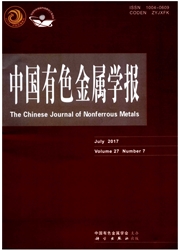

 中文摘要:
中文摘要:
通过末端淬火实验、硬度测试、透射电子显微镜和差示扫描量热法,研究淬火速率对7085铝合金时效行为的影响。结果表明:在末端淬火过程中,距离淬火端越近,淬火速率越大,时效后的峰值硬度越高。当时效温度较低时,淬火速率越大,则空位扩散激活能越小,时效处理后的硬度达到峰值的时间越短,硬度值越大;随着时效温度的提高,不同淬火速率样品达到峰值的时间不断接近;当时效温度达到160℃时,不同淬火速率样品达到峰值的时间相同,均为10 h。TEM分析结果表明:随着淬火速率降低,淬火过程中析出的平衡相η数量和尺寸也随之增加,时效后析出的强化相η'数量减少,尺寸增加,弥散程度降低。
 英文摘要:
英文摘要:
The effect of quenching rate on aging behavior of 7085 aluminum alloy was investigated by means of end quenching test, hardness test, transmission electron microscopy (TEM) and differential scanning calorimeter (DSC). The results show that the faster the quenching rate is, the higher the peak hardness is. With the quenching rate increasing, the lower the aging temperature is, the shorter time reaching the peak hardness is and the higher the hardness gets, which is related to the decrease of the vacancy diffusion activation energy. With the aging temperature increasing, the time reaching the peak hardness gets closer and closer, when aging at 160℃, the peak aging time are all 10 h. TEM observation shows that, with the decrease of quenching rate, the number and the size of quench-induced equilibriumη phase increase. After aging, the number and the diffusion degree ofη' strengthening precipitates decrease and the size becomes larger.
 同期刊论文项目
同期刊论文项目
 同项目期刊论文
同项目期刊论文
 期刊信息
期刊信息
